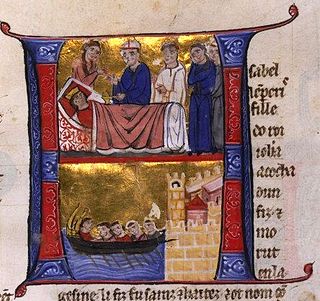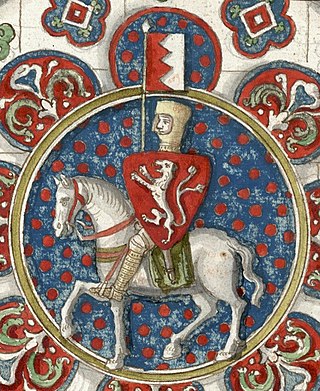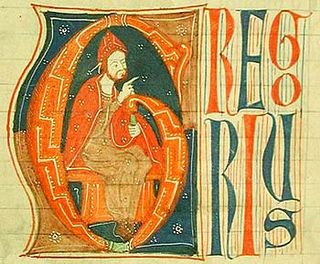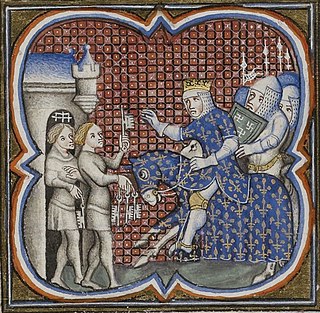
Louis IX, also known as Saint Louis, was King of France from 1226 until his death in 1270. He is widely recognized as the most distinguished of the Direct Capetians. Following the death of his father, Louis VIII, he was crowned in Reims at the age of 12. His mother, Blanche of Castile, effectively ruled the kingdom as regent until he came of age and continued to serve as his trusted adviser until her death. During his formative years, Blanche successfully confronted rebellious vassals and championed the Capetian cause in the Albigensian Crusade, which had been ongoing for the past two decades.
Year 1141 (MCXLI) was a common year starting on Wednesday of the Julian calendar.
Year 1252 (MCCLII) was a leap year starting on Monday of the Julian calendar.
The 1250s decade ran from January 1, 1250, to December 31, 1259.

Year 1228 (MCCXXVIII) was a leap year starting on Saturday of the Julian calendar.
The 1230s was a decade of the Julian Calendar which began on January 1, 1230, and ended on December 31, 1239.
The 1240s was a decade of the Julian Calendar which began on January 1, 1240, and ended on December 31, 1249.
The 1260s is the decade starting January 1, 1260 and ending December 31, 1269.
The 1270s is the decade starting January 1, 1270, and ending December 31, 1279.
Year 1250 (MCCL) was a common year starting on Saturday of the Julian calendar.
Year 1251 (MCCLI) was a common year starting on Sunday of the Julian calendar.

Year 1231 (MCCXXXI) was a common year starting on Wednesday of the Julian calendar.
Year 1235 (MCCXXXV) was a common year starting on Monday of the Julian calendar.

Year 1241 (MCCXLI) was a common year starting on Tuesday of the Julian calendar.

Year 1260 (MCCLX) was a leap year starting on Thursday of the Julian calendar.

Year 1265 (MCCLXV) was a common year starting on Thursday of the Julian calendar.

Philip III, called the Bold, was King of France from 1270 until his death in 1285. His father, Louis IX, died in Tunis during the Eighth Crusade. Philip, who was accompanying him, returned to France and was anointed king at Reims in 1271.

Louis VIII, nicknamed The Lion, was King of France from 1223 to 1226. As a prince, he invaded England on 21 May 1216 and was excommunicated by a papal legate on 29 May 1216. On 2 June 1216, Louis was proclaimed "King of England" by rebellious barons in London, though never crowned. He quickly seized half the English kingdom but was eventually defeated by the English. After the Treaty of Lambeth, he was paid 10,000 marks, pledged never to invade England again, and was absolved of his excommunication.

The Eighth Crusade was the second Crusade launched by Louis IX of France, this one against the Hafsid dynasty in Tunisia in 1270. It is also known as the Crusade of Louis IX Against Tunis or the Second Crusade of Louis. The Crusade did not see any significant fighting as Louis died of dysentery shortly after arriving on the shores of Tunisia. The Treaty of Tunis was negotiated between the Crusaders and the Hafsids. No changes in territory occurred, though there were commercial and some political rights granted to the Christians. The Crusaders withdrew back to Europe soon after.

Philip Ι of Montfort was Lord of La Ferté-Alais and Castres-en-Albigeois 1228–1270, Lord of Tyre 1246–1270, and Lord of Toron aft. 1240–1270. He was the son of Guy of Montfort and Helvis of Ibelin.










